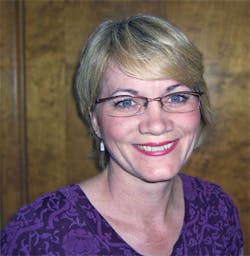AviaEd (www.aviaed.net), with its partner firm ssi/Safety and Security Instruction, offers a host of airport and airfield training, including hazmat. De Rodriguez started the firm in 1997, at that point focusing on airport security training at Phoenix Sky Harbor International Airport. To date the firm has trained some 17,000 airport employees; since 9/11, much of the training has been with airport security coordinators, who are responsible for connecting the security dots among airport, airline, and other tenant employees.
Following are edited highlights of the Airport Business interview with de Rodriguez.
On the change in perspective following the 9/11 attacks ...
"Prior to 2001, SIDA [security identification display area] training was not well communicated among the airlines, from my perspective. After 9/11, the emphasis changed.
"TSA had one requirement, the airport security coordinator regulation, that said every airport should have at least one or two people as airport security coordinators. And they would be required to go through training. I and others, including ACI-NA [Airports Council International-North America], asked TSA what does that mean? TSA came back with the response, 'We are working on it, but we expect the industry to tell us what that means.'
"That's when I worked together with ACI-NA and said, here's what it could be— something that is required but which takes into account the fact that many of these folks had many years of experience. Essentially, the airport folks need to ensure that they're checking their job requirements against what the regulations say that they have to be."
On self-training versus third-party ASC training ...
"It's mandated that airports do security coordinator training; that they have someone at their airport who has been trained on the regulations. There is a curriculum that has to be followed that says that they understand what their responsibilities are. Where they get that training was always the question.
"They could self-train. The value that an AviaEd or AAAE [American Association of Airport Executives] brings is airports from a region can all get together in the same forum. Although they're not the same size airports, they still have the same requirements. This allows for networking, sharing best practices and ideas, and at the end of the day walking away with a better understanding that their airport is doing what it should have been doing all along. They're more solid in that belief.
"An airport contacts us and we make others in the region aware. We're doing one in Ft. Lauderdale and they opened it up to others who wanted to join us. It looks as though three or four other airports will be joining the Ft. Lauderdale staff. It's also been successful wrapping it around state meetings. We did it in New York and Michigan. It works well as an extra day onto their conferences, since the people will be there anyway."
On the greatest concern she's hearing from trainees at airports ...
"The issue is the constant change. Most of these airports don't get to see the broad picture— what's going on in West Virginia is different than what's going on in Montana.
"They would like to get a better feel for how TSA can work with them, and having everyone on the same page.
"Airports are not necessarily looking for direction from TSA as much as they're looking for insights as to what specifically TSA will be inspecting them on, be it quarterly, yearly, or whatever? An airport has so many areas to be concerned about."
On the mood of the industry and its relationship with TSA ...
"I don't think there's a lot of animosity out there; there was in the beginning. In 2002-2003, there was a lot of disagreement. In the last several years there's been a lot more agreement between the TSA and what the airports are doing. That's getting better.
"When TSA is inspecting an airport and giving a good debrief, it is beneficial to the airport. Some airports are still frustrated by the fact that they get a debrief in the form of a letter of investigation saying this was found on our recent inspection. It's a matter of 'gotcha.'
"Airports are asking to be informed in their monthly meetings that they have with the TSA of what TSA might be finding, and then work at ways to get it fixed."
On the state of security at U.S. airports ...
"I'm not concerned about the security of our airports. There are multiple ways that airports are safe."





